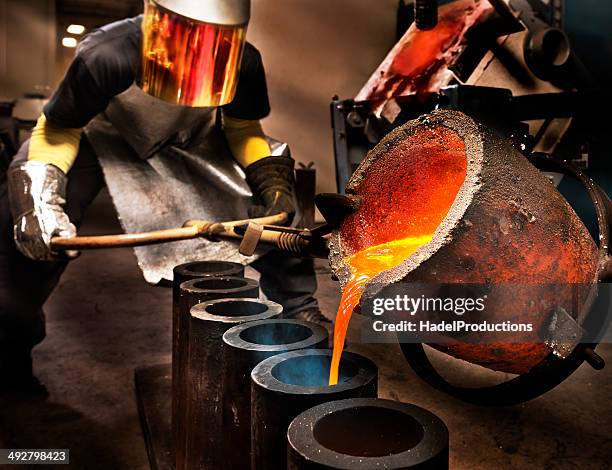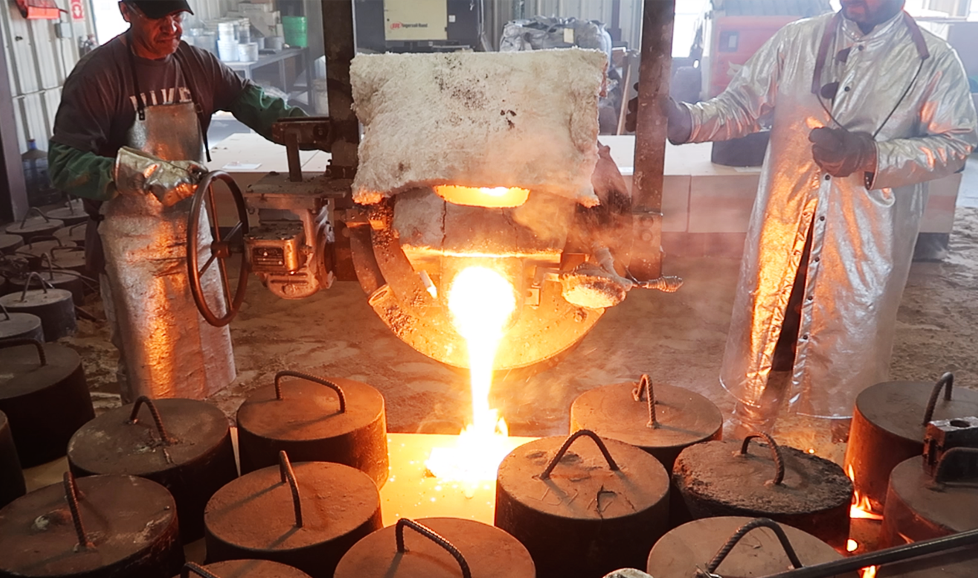Beginner’s Guide into How a Metal Foundry Manufactures Durable Metal Components
Wiki Article
A Comprehensive Guide to Metal Casting: Benefits and Solutions Offered by Foundries
Metal casting is a critical process in different sectors, offering numerous advantages with the services of foundries. These centers change molten metal into durable and specific parts, accommodating details client needs. By using sophisticated technologies, foundries assure high quality and efficiency in production. The details of metal casting and the varied techniques involved raise important questions regarding its duty in contemporary manufacturing. What advancements lie ahead in this important field?Comprehending the Metal Casting Process
The metal casting process is a basic strategy made use of in producing to create complex shapes and components. This approach involves putting liquified metal into a mold designed to form the preferred object. The process starts with pattern development, which works as a design template for the mold. Metal Casting. Various materials, such as sand, metal, or ceramic, are used for mold-making, depending upon the particular needs of the casting
When the mold is ready, liquified metal is put right into it and allowed to strengthen and cool down. After solidification, the mold and mildew is eliminated, disclosing the cast component. Various methods, consisting of sand casting, financial investment casting, and die casting, are employed, each matched to different applications and products. Quality control procedures, such as examinations and testing, are necessary to guarantee the final item fulfills specs. Overall, the metal casting process plays an essential role in producing parts for sectors ranging from automobile to aerospace.
Trick Advantages of Metal Casting
Metal casting provides substantial benefits that make it a recommended manufacturing method in different industries. Its style adaptability and precision enable detailed forms, while cost-effective automation enhances performance. Additionally, the adaptability and toughness of products made use of in casting add to the longevity of the final items.Design Adaptability and Accuracy
Releasing impressive design flexibility and accuracy, metal casting enables engineers and designers to develop complex forms and features that would be tough or impossible to achieve with various other making methods. This ability enables the production of complicated geometries, inner frameworks, and fine information that improve item functionality and appearances. Additionally, numerous casting methods, such as sand casting, investment casting, and pass away casting, provide further alternatives for customization, accommodating varied material residential properties and project demands. The adaptability of mold and mildews allows modifications throughout the style stage, improving the change from idea to end product. Inevitably, metal casting stands apart for its capability to supply high-precision parts, making it an important procedure in markets ranging from automobile to aerospace and beyond.Economical Automation
Economical automation stands as one of the main benefits of metal casting, allowing manufacturers to create large amounts of components at a lower cost each. This performance occurs from the capacity to create detailed molds that can be reused numerous times, substantially minimizing arrangement and functional prices. Furthermore, metal casting processes, such as sand casting and die casting, allow for high throughput, making it possible to meet the needs of massive production runs. The reduced material waste and power intake even more enhance price financial savings, making metal casting an eye-catching alternative for sectors needing mass elements. Overall, the cost-efficient nature of metal casting positions it as a recommended technique for makers aiming for economic performance in their production procedures.Product Flexibility and Stamina
One of the standout characteristics of metal casting is its exceptional material flexibility, which enables making use of a wide variety of alloys and steels. This versatility allows makers to choose materials that best suit their specific applications, from light weight aluminum and bronze to iron and steel. Each metal provides one-of-a-kind residential properties, consisting of differing levels of stamina, rust resistance, and thermal conductivity. Subsequently, metal casting can create components that fulfill rigorous performance demands across varied industries, such as vehicle, aerospace, and construction. Additionally, the strength of cast metals can be enhanced via numerous treatment processes, guaranteeing resilience and longevity. Aluminum Foundry. On the whole, the mix of product convenience and integral stamina makes metal casting a recommended option for creating premium partsSorts Of Metal Casting Strategies
Metal casting includes a range of methods that deal with various production needs and product properties. Common approaches consist of sand casting, which uses a sand mold and mildew for complicated forms, and investment casting, understood for its accuracy and surface area finish. Pass away casting is one more method that utilizes high-pressure shot of liquified metal into mold and mildews, ideal for mass production of tiny parts.Shell molding provides a quicker different, making use of a resin-coated sand to produce thin-walled molds, while shed foam casting permits intricate styles without the requirement for a core.
Additionally, continual casting is utilized for generating lengthy areas of metal, such as sheets or bars, by strengthening molten metal in a constant procedure. Each strategy is and provides special advantages selected based on aspects like the called for information, manufacturing volume, and product kind, making certain remarkable outcomes in metal fabrication across different industries.
The Role of Foundries in Metal Casting
Shops play a pivotal function in the metal casting procedure, working as the centers where molten metal is transformed right into finished items. These specialized establishments are equipped with the needed tools and innovations to handle numerous steels, making sure top notch outcomes. Shops are accountable for several essential functions, including melting the metal, pouring it right into mold and mildews, and permitting it to solidify.Furthermore, they preserve rigorous safety and environmental criteria to shield employees and minimize environmental effect. Knowledgeable professionals and engineers team up to optimize casting procedures, enhancing performance and lowering waste. Factories see this likewise involve in top quality control measures, guaranteeing that the end products fulfill certain tolerances and specs. This quality control is essential for markets that count on exact parts, such as auto and aerospace. Consequently, foundries contribute substantially to the overall production landscape, enabling innovation and growth throughout different sectors.
Custom Metal Casting Services
Custom-made metal casting services supply customized style options that fulfill details client demands. These services likewise provide product selection proficiency, guaranteeing the right metal is chosen for the wanted application. Such adaptability and knowledge improve the general top quality and efficiency of the last item.
Customized Design Solutions
Tailored design options in metal casting give producers with the adaptability to create components that meet particular performance and visual needs. Foundries supply tailored services that allow customers to define measurements, shapes, and surface area coatings to achieve wanted end results. This customization procedure usually includes cooperation between engineers and developers, making certain that the end products align with functional demands and industry criteria. Advanced modern technologies, such as computer-aided style (CAD) and simulation software program, enable accurate modeling and testing of elements prior to manufacturing, minimizing mistakes and improving effectiveness. By leveraging tailored style services, organizations can optimize performance while minimizing waste and expenses, ultimately resulting in a much more one-upmanship on the market. This versatility is crucial for markets calling for one-of-a-kind applications and specs.Product Choice Expertise
When selecting products for metal casting, knowledge plays an important role in making sure that the right option aligns with both efficiency demands and cost-effectiveness. Shops use proficient experts who recognize the residential properties of various steels and alloys, allowing them to advise optimal products for specific applications. Elements such as stamina, deterioration resistance, and thermal conductivity are meticulously thought about to meet the customer's requirements. Furthermore, sector trends and improvements in material scientific research notify these choices, enabling foundries to remain competitive. By leveraging their competence, factories can aid clients in steering via complex product options, ultimately causing enhanced item quality and lowered production costs. This customized understanding is essential for attaining effective results in custom metal casting services.Quality Assurance in Metal Casting
Quality assurance in metal casting is critical to ensure that the final products satisfy the called for requirements and efficiency criteria. Shops utilize a range of strategies and techniques to assure the finest of actors components. This process begins with rigid product assessments, validating that resources follow sector requirements. Throughout the casting process, real-time tracking and testing are carried out to evaluate criteria such as temperature, mold and mildew integrity, visit our website and dimensional accuracy.
Applications of Metal Castings Across Industries
Metal spreadings play a vital duty in numerous sectors, acting as the backbone for numerous applications. In the auto industry, cast parts such as engine blocks and transmission real estates are essential for lorry efficiency and integrity. The aerospace sector counts on precision castings for important components that guarantee safety and effectiveness in trip. In addition, the building and construction industry uses metal castings for fixtures, fittings, and architectural components, boosting the longevity of structures and infrastructure.Furthermore, the energy industry take advantage of castings used in generator blades and other equipment important for power generation - Aluminum Foundry. The medical field additionally makes use of metal castings in tools and gadgets, showing the versatility of this manufacturing procedure. On the whole, metal spreadings are indispensable to the functionality and development of diverse industries, showcasing their importance in modern-day technology and infrastructure advancement
Frequently Asked Concerns
What Products Are Commonly Used in Metal Casting?
Typical products used in metal casting include light weight aluminum, iron, steel, brass, and bronze. Each material provides special residential properties suitable for various applications, enabling manufacturers to pick the most effective option based upon weight, strength, and rust resistance.How Long Does the Metal Casting Refine Commonly Take?
The metal casting resource procedure generally takes numerous hours to a few days, relying on factors such as the complexity of the layout, kind of metal utilized, and the specific casting method utilized by the shop.
What Is the Ecological Effect of Metal Casting?
The ecological effect of metal casting consists of power intake, emissions, and waste generation. Shops commonly implement procedures to mitigate these impacts, such as reusing products and using cleaner technologies to reduce their ecological impact.Can Metal Casting Be Provided For Small-Scale Projects?
Metal casting can undoubtedly be done for small jobs. Various foundries accommodate such demands, offering customized options that suit minimal manufacturing runs while maintaining top quality and accuracy in the last items.What Are the Safety And Security Actions in Metal Casting Foundries?
In metal casting factories, precaution include individual safety tools, appropriate ventilation, training on tools use, emergency situation procedures, routine maintenance checks, and adherence to sector security criteria to lessen risks connected with molten metal and hazardous products.Furthermore, metal casting procedures, such as sand casting and pass away casting, enable for high throughput, making it possible to satisfy the demands of massive manufacturing runs. One of the standout attributes of metal casting is its exceptional product adaptability, which enables for the use of a wide range of metals and alloys. Furthermore, continual casting is utilized for producing lengthy sections of metal, such as bars or sheets, by strengthening molten metal in a constant procedure. Factories play a pivotal function in the metal casting procedure, serving as the centers where molten metal is changed right into ended up items. Common products used in metal casting consist of light weight aluminum, iron, brass, steel, and bronze.
Report this wiki page